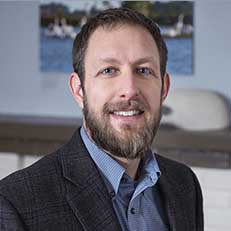BLOOMINGTON, Ind. - Research has clearly shown that cover crops hold the potential to improve soil health, reduce erosion, enhance water quality, and even fight climate change.
Yet recent work from researchers at the Paul H. O’Neill School of Public and Environmental Affairs shows that for many farmers, the decision to adopt cover crops isn’t as simple as a cost-benefit analysis, even when there may be incentives in place to encourage their use.
Assistant Professor Landon Yoder collaborated with colleagues from The Nature Conservancy and the University of Illinois at Urbana-Champaign on two separate studies looking at how crop insurance discount programs could encourage farmers to use cover crops, non-cash crops planted to protect and improve soil rather than for harvest. One of the projects, “Cover crops as climate insurance: Exploring the role of crop insurance discounts to promote climate adaptation and mitigate risk,” was recently published in the Journal of Environmental Management, while another study, “Risk mitigation or risky business? Agricultural stakeholders’ perspectives on crop insurance discount programs, cover crops, and risk management,” recently appeared in the Journal of Soil and Water Conservation.
“We looked at basically two key things,” Yoder said. “First, do farmers see cover crops as helping when it comes to dealing with extreme weather, such as more drought and flooding? Second, would a discount on crop insurance premiums encourage more farmers to try cover crops?”
The first study, which was funded jointly by the National Science Foundation’s Dimensions of Socio-Environmental Systems program and the Nina Mason Pulliam Charitable Foundation, found that farmers’ risk perceptions of experiencing extreme weather do not correspond to the use of winter cover crops, but farmers do see cover crops as being helpful for dealing with extreme weather.
“Basically, farmers think it's helpful, but they are not really motivated by extreme weather to use them,” Yoder said.
Yoder and his colleagues surveyed 1,023 farmers in Indiana, Illinois, and Iowa and found that the farmers didn’t perceive cover crops as harming their cash crop yields—a key concern for scaling up the practice. In fact, twice as many farmers perceived cover crops as leading to increased cash crop yields as opposed to leading to declines.
Yoder’s second study used focus groups of farmers, government officials, and crop insurance agents to determine whether discounts on crop insurance premiums could be a motivator for farmers to try cover crops. Researchers found that farmers didn’t view a discount as a motivator to start using cover crops, but they did see it as encouraging farmers who already use cover crops to continue the practice.
“What really stood out from these focus group discussions was two ideas,” Yoder said. “First, farmers want more accurate data on how cover crops affect yields—some subsidies are useful to help get farmers started, but really, they want to see the business case for using cover crops. Second, although the financial incentive for the discount is small, the wide use of crop insurance gives the idea of promoting cover crops through crop insurance a lot of potential for sharing information and tutorials about how to use cover crops more effectively.”
Yoder and his colleagues plan to continue to study the issue, focusing on farmers' strategies for selecting cover crop species—grasses, legumes, or mixes. They will also explore whether farmers had good or bad experiences with them, whether they plant them in the same field or rotate them, and what policy approaches farmers would support to encourage more widespread use of the practice.
“One intriguing aspect of looking across both studies is that farmers in the focus groups wanted to see the business case, while in the survey data the farmers that have used cover crops mostly see them as neutral or beneficial for cash crop yields, Yoder said. “That suggests cover crops can help with profitability instead of being an additional cost. It’s an important future research question as multiple studies have argued that cover crops represent a financial loss for farmers, except when used for grazing livestock.”


